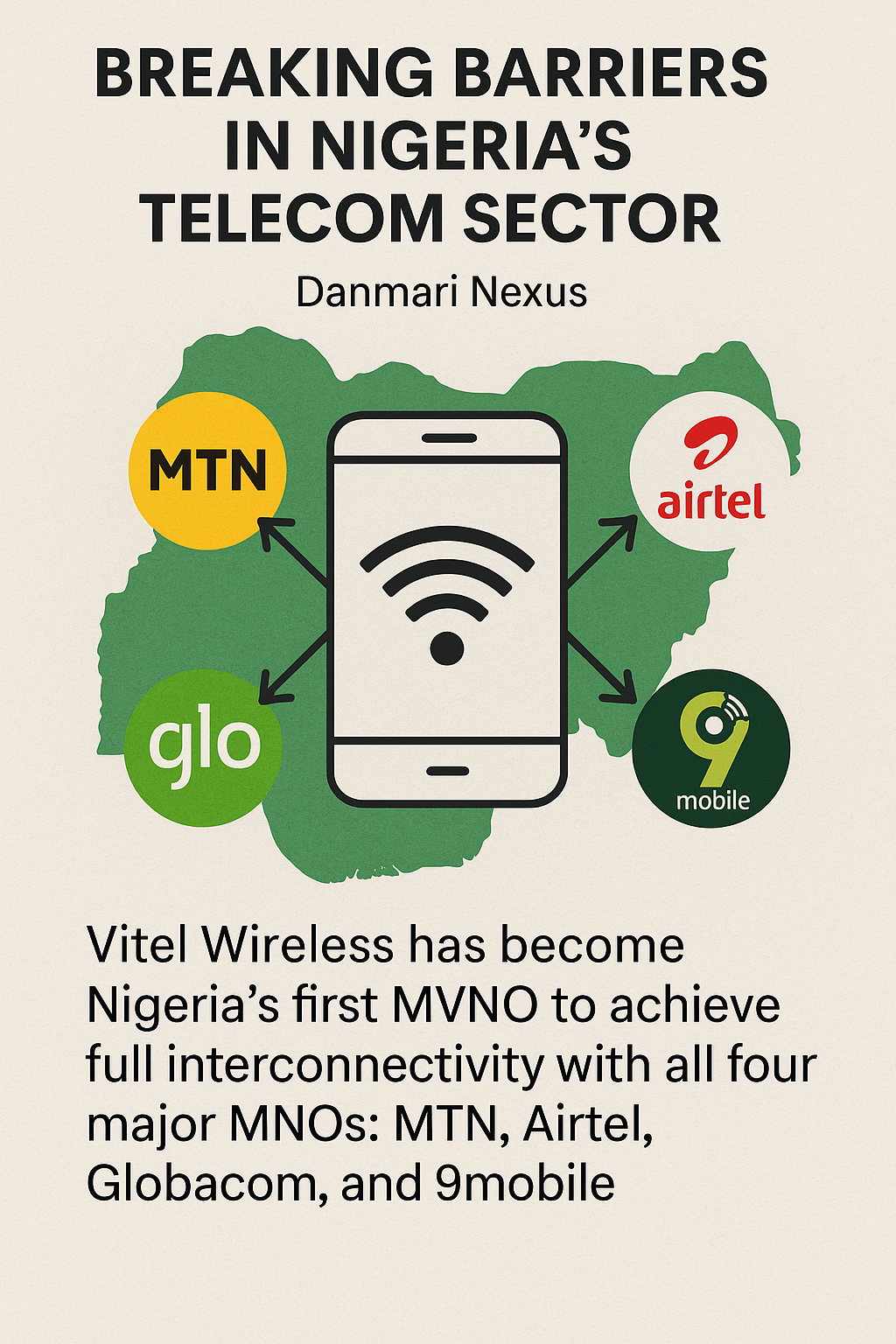“With full interconnection to all major networks, Vitel sets a new standard for MVNOs in Nigeria.” – Danmari Nexus Commentary
Nigeria
In a historic move for Nigeria’s telecommunications landscape, Vitel Wireless has become the country’s first Mobile Virtual Network Operator (MVNO) to complete full interconnectivity with the four major Mobile Network Operators (MNOs) – MTN, Airtel, Globacom, and 9mobile.
This breakthrough comes after the Nigerian Communications Commission (NCC)- Nigeria’s telecom regulator – granted Vitel the 0712 number range, officially authorizing it to operate on a nationwide scale.
What Is an MVNO and Why Does It Matter?
MVNO (Mobile Virtual Network Operator): A company that provides mobile services without owning its own infrastructure. Instead, it leases access to network capacity from existing MNOs.
MNO (Mobile Network Operator): A traditional telecom company that owns its infrastructure (cell towers, radio frequencies, etc.). Examples in Nigeria include MTN, Airtel, Globacom, and 9mobile.
NCC (Nigerian Communications Commission): The federal body that regulates Nigeria’s telecom sector, ensuring fair competition, enforcing service standards, and managing licensing and spectrum allocation.
Why Vitel’s Milestone Is a Game Changer
Nigeria introduced its MVNO framework in August 2022, with over 40 companies securing licenses. Despite this, many have struggled to launch due to complex negotiations with MNOs. Vitel’s success in achieving full interconnectivity is the first tangible proof that MVNOs can integrate and operate efficiently in the Nigerian market.
“Vitel’s milestone is not just about a new operator—it’s about changing the dynamics of mobile service delivery in Nigeria.”
— Danmari Nexus Commentary
The Pros: Opportunities for Nigeria
-
Increased Competition: Vitel’s entry will likely drive competitive pricing and improved customer service.
-
Digital Inclusion: MVNOs are expected to reach underconnected and rural communities, where MNOs have limited penetration.
-
Innovation Catalyst: MVNOs are more agile and can bring in services like smart SIMs, flexible billing, mobile banking, and more.
The Cons: Risks and Realities
-
Market Overload: With so many MVNO licenses issued, only a few will stand out without smart branding and segmentation.
-
Operational Complexity: MVNOs must still handle customer support, billing, and marketing, without owning core infrastructure.
-
Commercial Barriers: Some MNOs may still resist offering favorable terms to MVNOs, making entry harder for others.
Lessons and Recommendations for Future MVNOs
-
Partner Smartly: Build collaborative and sustainable agreements with MNOs from the outset.
-
Focus on Niche Markets: Target specific groups like university students, rural dwellers, or SMEs.
-
Add Value: Introduce non-traditional telecom services -IoT, health alerts, fintech apps, etc.
-
Follow the Rules: Strict compliance with NCC’s framework will ensure smoother launch and operations.
-
Win Trust Early: Invest in customer care and local engagement to build brand credibility.
Conclusion: A Blueprint for the Future
Vitel’s full interconnection marks a new era for Nigeria’s telecom industry. It proves that with vision, regulatory support, and commercial grit, MVNOs can emerge not just as competitors, but as collaborators in delivering more affordable, accessible, and innovative mobile services.
As other MVNOs look to follow Vitel’s lead, the message is clear: Nigeria is ready for telecom diversity, and the race to deliver is just beginning.


